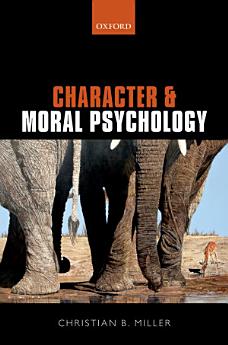Character and Moral Psychology
ม.ค. 2014 · OUP Oxford
eBook
288
หน้า
family_home
มีสิทธิ์
info
reportคะแนนและรีวิวไม่ได้รับการตรวจสอบยืนยัน ดูข้อมูลเพิ่มเติม
เกี่ยวกับ eBook เล่มนี้
Philosophers and psychologists have been hard at work trying to unlock the mysteries of our characters. Unfortunately, their answers have been all over the map. According to one position, every single person has all of the moral virtues, such as modesty and compassion, although to varying degrees. Yet according to another position, no one has any character traits at all since they are simply illusions and do not exist. Hence not one person is honest or compassionate or courageous. And between these extremes, there are plenty of intermediate views. Christian B. Miller argues that not one of these leading positions accurately reflects what most of us are like today. He explores the implications of the Mixed Trait framework-a theory of moral character developed in his previous book, Moral Character: An Empirical Theory. Mixed traits have both morally positive aspects (hence they are not vices) along with morally negative aspects (hence they are not virtues). Miller engages with the other leading positions on the empirical nature of character: situationism, the CAPS model, the Big Five model, and the local trait model. He goes on to apply the Mixed Trait framework to several important topics in ethics, especially the development of an error theory about judgments of character and the challenge faced by virtue ethics from the widespread lack of virtue.
เกี่ยวกับผู้แต่ง
Christian Miller is Associate Professor of Philosophy at Wake Forest University. His main areas of research are meta-ethics, moral psychology, moral character, action theory, and philosophy of religion. He is also the author of Moral Character: An Empirical Theory (OUP 2013), and the editor of The Continuum Companion to Ethics (Continuum 2011) and Essays in the Philosophy of Religion (OUP 2006). His work has appeared in such journals as Noûs, Philosophy and Phenomenological Research, Philosophical Studies, Philosophical Psychology, The Journal of Ethics, Journal of Ethics and Social Philosophy, and Oxford Studies in Philosophy of Religion. He is the director of The Character Project (www.thecharacterproject.com), which is funded by a substantial grant for the study of character from the John Templeton Foundation.
ให้คะแนน eBook นี้
แสดงความเห็นของคุณให้เรารับรู้
ข้อมูลในการอ่าน
สมาร์ทโฟนและแท็บเล็ต
ติดตั้งแอป Google Play Books สำหรับ Android และ iPad/iPhone แอปจะซิงค์โดยอัตโนมัติกับบัญชีของคุณ และช่วยให้คุณอ่านแบบออนไลน์หรือออฟไลน์ได้ทุกที่
แล็ปท็อปและคอมพิวเตอร์
คุณฟังหนังสือเสียงที่ซื้อจาก Google Play โดยใช้เว็บเบราว์เซอร์ในคอมพิวเตอร์ได้
eReader และอุปกรณ์อื่นๆ
หากต้องการอ่านบนอุปกรณ์ e-ink เช่น Kobo eReader คุณจะต้องดาวน์โหลดและโอนไฟล์ไปยังอุปกรณ์ของคุณ โปรดทำตามวิธีการอย่างละเอียดในศูนย์ช่วยเหลือเพื่อโอนไฟล์ไปยัง eReader ที่รองรับ







